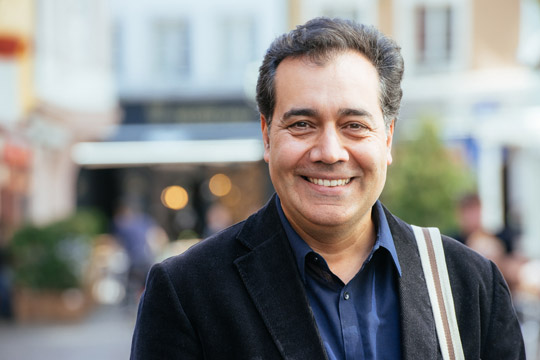The French of the Orient
Freiburg, May 03, 2018
Dari, Farsi, Tajiki: Hardly any other language has as many names as Persian does – the names of the language variations differ depending on the country in which they are spoken. Persian is often mistaken for Arabic because both languages use the same alphabet and writing direction - from right to left – but they belong to different linguistic families. In a series about seldom-learned languages, Christine Hohlbaum talked with the lecturer Dr. Shahrokh Raei about the advantages and misunderstandings of Persian.
 The Iranian native Shahrokh Raei has been teaching Persian since 2009. In April 2016, he took a position in the Oriental Seminar at the University of Freiburg.
The Iranian native Shahrokh Raei has been teaching Persian since 2009. In April 2016, he took a position in the Oriental Seminar at the University of Freiburg.
Photo: Klaus Polkowski
Mr. Raei, why is Persian considered one of the seldom-learned languages?
Shahrokh Raei: Iran is located on a totally different continent. Its geographical distance alone means most Freiburg students have no connection to Persian. If you were to observe Germany’s international relations, you would see that Spanish, French or Portuguese is much closer in proximity. An average of 15 to 20 people take Persian per semester at the University of Freiburg – that is about half of the students who are pursuing Islamic studies. Seen in that light, you can see that the interest level for the language is pretty high after all.
What are the reasons someone should learn Persian?
A language is always an expression of the culture in which it is spoken. In many ways you can equate them. If you want to pursue Iranian Studies and wish to study Iranian culture and history, you must also deal with the language. If you look at Persian history, you will see that the Persians in the Iranian highlands were originally followers of Zoroastrianism. It was only when the area underwent Islamization that they adopted the characters of Arabic, although Persian is a completely different language. In addition, Persian literature contains valuable treasures. Goethe was certainly not the only one who was fascinated by Hafez's poems.
Which Persian expression should everyone learn?
“Farsi schekar ast” literally means “Persian sugar is” or put another way: “Persian is as sweet as sugar.” I often hear from those who learn Persian that the language has a very pleasant sound. Perhaps this is why Persian is sometimes called the “French of the Orient.”
What is your favorite word?
“Dūst” would be my favorite word. It means something like “partner,” “bosom buddy” or “lover.”
What “false friend” should people watch for in Persian?
I would have to think about that for a while because the languages are so different. But if you were to consider the pronunciation of the word “money” (pūl) for instance, any English-speaking person might think we mean swimming pool.
Which Persian expression do you miss in German?
There is indeed a greeting that I miss a lot in the German language: “Chaste nabaschid!” It means “May you not be tired!” You say that to a person who is currently working or undergoing some kind of physical excursion.
Which Persian word best describes the University of Freiburg?
I can sum it up in one word: Pouya! It means “dynamic.” The University definitely exudes a certain kind of energy.
Language Teaching Centre
The Language Teaching Centre (SLI) at the University of Freiburg offers courses in more than 20 languages that are open to all students, staff and University guests along with the general public.
Course offerings and registration

